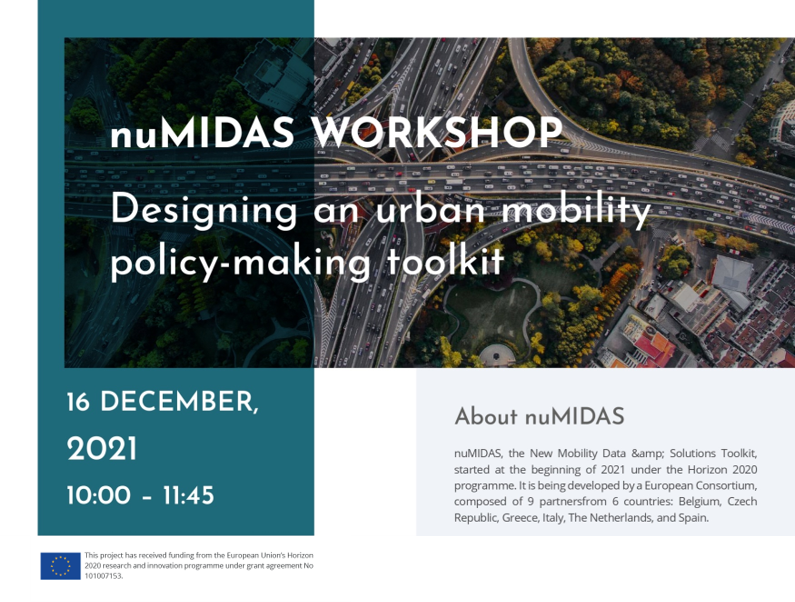On 16 December 2021, the nuMIDAS team organised an online workshop for policy makers, researchers, and other interested stakeholders. The goal of the workshop was to disseminate and discuss the first results of nuMIDAS, as well as our ideas of the use cases and the related advanced methods and tools. During the workshop, input was gathered on the use cases and the requirements of a toolkit as proposed by nuMIDAS. In total, there were 41 attendees from a variety of stakeholders throughout Europe.
The workshop consisted of two parts. First, a short introduction on the nuMIDAS project, as well as the use cases was given by Sven Maerivoet. Afterwards, the attendees were divided into multiple break-out rooms, where the use cases were discussed in more detail. Attendees were able to choose topics of their interest. The group was divided into five break-out rooms, as the use cases on shared mobility were combined into a single break-out room due to their close relation. The topics for the five break-out rooms were the following:
- Shared mobility;
- Vehicle emissions and air quality analysis;
- Planning for parking;
- In and outflows of a metropolitan area;
- Assessment of traffic management scenarios.
We would like to thank all the participants for attending!
There were two break-out room sessions, resulting in a total of ten discussions. We will shortly elaborate on two of the interesting discussions during the workshop.
In the shared mobility break-out room sessions, discussions were held related to regulations regarding the areas where vehicles can operate, and how to ensure proper parking, safe driving, data sharing, and using this data for the analysis of travel demand, planning, and monitoring of supply and fleet distribution and operation. In terms of data sharing, it was concluded that a framework in which service operators are required to share specific data to the municipalities is missing, but desired. Furthermore, the challenge in the modal shift was discussed, as currently shared mobility often replaces public transport trips, while it is desired that the two would be complementary. Trip purpose plays a large role in this.
The discussion on air quality analysis gave insight into the complexity of this topic. Lack of data, as well as integration of existing data are common issues. Widespread sensors are required to get good insight into the actual air quality, as it is very dependant on location, weather and other factors. Ideas on mobile sensors or crowdsourcing of data were discussed as solutions to these problems. The actual use of the data and related privacy and security issues were discussed as well. Often forgotten are other externalities, such as noise pollution and impact of the logistics sector.
Interested in more results from the workshop? An extended summary of the results will be given in our Deliverable 3.2.





